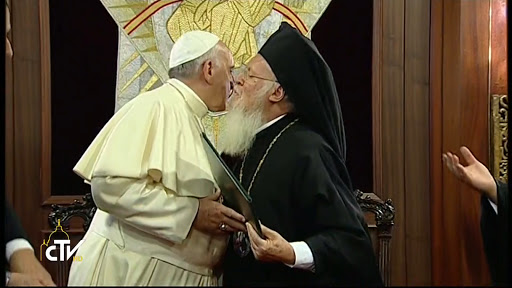Yesterday evening, in an ecumenical prayer at Istanbul’s Patriarchal Church of St. George, Pope Francis spoke exaltedly of his spiritual brotherhood with Bartholomew I, Ecumenical Patriarch of Constantinople.
“What a grace, Your Holiness, to be brothers in the hope of the Risen Lord!” the Pope said, addressing the Patriarch directly. “What a grace, and what a responsibility, to walk together in this hope, sustained by the intercession of the holy Apostles and brothers, Andrew and Peter!”
The occasion was the eve of Feast Day of St. Andrew, patron of the Ecumenical Patriarchate of Constantinople, which governs northern Greece and Mt. Athos, and exercises a degree of moral leadership among the world’s Orthodox communions.
Since 1969, the Vatican has regularly dispatched representatives to Istanbul to attend the patronal feast, while the patriarchate has sent annual delegations to Rome for the Solemnity of St. Peter. Popes St. John Paul II and Benedict XVI both appeared in person to represent the Church of Rome.
In the short time since his elevation to the papacy, Pope Francis has built an especially harmonious relationship with Patriarch Bartholomew, a Turkish citizen of Greek ethnicity who has held his office since 1991. In 2013, Bartholomew became the first Ecumenical Patriarch to attend the installation of a Pope of Rome. The following May, the two met in Jerusalem and held a prayer service at the Church of the Holy Sepulchre.
The Jerusalem meeting marked the 50
th anniversary of the meeting between Pope Paul VI and Ecumenical Patriarch Athenagoras, which ushered in a new commitment to dialogue between the Eastern and Western Churches. A few weeks later, Pope Francis invited the patriarch to the Vatican, to join Israeli President Shimon Peres and Palestinian President Mahmoud Abbas in praying for peace.
th anniversary of the meeting between Pope Paul VI and Ecumenical Patriarch Athenagoras, which ushered in a new commitment to dialogue between the Eastern and Western Churches. A few weeks later, Pope Francis invited the patriarch to the Vatican, to join Israeli President Shimon Peres and Palestinian President Mahmoud Abbas in praying for peace.
Religion News Service’s Josephine McKenna described Francis’ and Bartholomew’s cooperative spirit as “a budding bromance.”
“The 74-year-old patriarch from Turkey and the 77-year-old Argentine Pontiff come from opposite sides of the globe, but the two have established a strong personal connection based on mutual respect and a humble and yet determined approach to confronting global issues like peace and climate change,” McKenna wrote. She added that the two "are said to communicate easily in Italian."
In their joint declaration to visit the Holy Land, the Pope and the Patriarch wrote of their common determination to work toward the full communion of the two Churches, which have been estranged since 1054.
The declaration states: “We look forward in eager anticipation to the day in which we will finally partake together in the Eucharistic banquet.” It also cautions: “Theological dialogue does not seek a theological lowest common denominator on which to reach a compromise, but is rather about deepening one’s grasp of the whole truth that Christ has given to his Church, a truth that we never cease to understand better as we follow the Holy Spirit’s promptings.”
The two leaders also agreed to work toward a new ecumenical council in 2025, marking the 1700
th anniversary of the Council of Nicaea. Speaking for himself and Francis, Bartholomew called plans for the council “a legacy to our successors and ourselves.”
th anniversary of the Council of Nicaea. Speaking for himself and Francis, Bartholomew called plans for the council “a legacy to our successors and ourselves.”
Vatican spokesman Father Federico Lombardi insists that the council “is not a
fait accompli,” warning that “it is very early to jump to conclusions.”
fait accompli,” warning that “it is very early to jump to conclusions.”
The Ecumenical Patriarchate of Constantinople is not precisely analogous to the papacy. Though recognized as a “first among equals” by the heads of the various Orthodox Communions, which account for 300 million faithful worldwide, the Ecumenical Patriarch does not command their obedience in the same way that a pope commands his bishops’. For that reason, among others, official spokespersons and observers alike hesitate to speak of full communion for all the historic Churches in any but the most guarded terms.
Still, Bartholomew has called for a pan-Orthodox synod to be held next year, at Istanbul’s Hagia Irene Church.
It was Patriarch Bartholomew who first greeted Pope Francis at Istanbul Atatürk Airport, where the Pope arrived yesterday morning after meeting with Turkish officials in Ankara. After completing a visit to Istanbul’s Blue Mosque and Hagia Sophia museum, the Pope arrived at the Church of St. George, where the patriarch received him at the gate and ushered him inside to the ringing of bells.
Flanked by priests in gold brocaded robes carrying lighted tapers, the Pope and the Patriarch marched up the aisle. As male choristers chanted, the Pope sat solemnly by the altar. Later, the Church heads recited the Doxology Service, a prayer for peace and thanksgiving, blessing the faithful that fairly crowded the 19
th-century church.
th-century church.
Echoing Francis’ theme in his own welcoming speech, Patriarch Bartholomew said his guest “translated the love of the Chief Apostle to his brother, the First-Called Apostle,” referring to Peter and Andrew, their respective patrons.
At the end of the service, the two exchanged kisses of peace. During the embrace, the Pope, who is taller than the patriarch, asked for a blessing and dropped his head. The patriarch planted a kiss on his zuchetto, or skullcap
Max Lindenman
writes from Turkey.
writes from Turkey.

